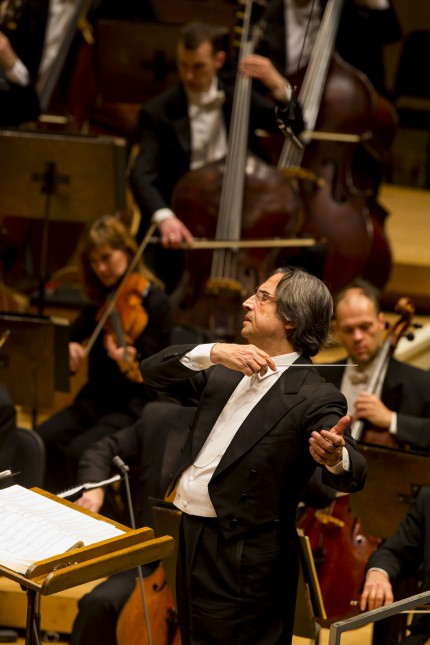Muti, CSO and Chorus soar with Schubert mass

As fine as the pair of Schubert symphonies were that launched Riccardo Muti’s season-long exploration of the composer last week, Thursday night’s performance of Schubert’s Mass in A flat by Muti and the Chicago Symphony Orchestra and Chorus will likely figure on Best of 2014 lists eleven months hence.
Perhaps the CSO’s music director was buoyed by signing his five-year contract extension earlier this week, along with that extra bit of inspiration that seems to occur when he is leading large-scale vocal works with the orchestra. Whatever the case, the close partnership between the CSO and their Italian maestro was firing on all cylinders Thursday night at Symphony Center.
Last week’s program centered on the earthy and bucolic—with some fleeting dark shadows in Schubert’s Fourth Symphony—while the second and final week of Riccardo Muti’s January residency centered on more transcendental matters.
If Schubert’s early works in the form are cast in a kind of formal Classical politesse, the late Mass in A flat shows a more distinct and boldly individual voice. Several moments could have come only from his pen—the dark lower voices in the Credo’s “Crucifixus etiam pro nobis,” the brilliant choral outburst in the Sanctus, and the thrilling choral fugue on the Gloria’s “Amen.” At times there is an austere and otherworldly quality that seems to be reflected in Schubert’s late sonatas and quartets.
Muti and his CSO forces put across the heaven-storming drama as much as the moments of consolation and spiritual introspection. As is his style, the conductor led a large chorus, 99 strong. Yet balances were meticulous, done with a natural ease that never seemed pedantic, with soloists, chorus, orchestra and organ all emerging with striking clarity.
While the singers chosen for Muti’s CSO choral works in the past have proven more variable than those in his concert operas, the current quartet was faultless. Rosa Feola’s ethereal pure soprano brought just the right degree of expressive poise to her solos, and mezzo Michaela Selinger, tenor Antonio Poli and bass Riccardo Zanellato were on the same high level.
This mass is really the chorus’s show and Duain Wolfe’s singers brought their customary corporate power and tonal refinement as well as an impressive clarity of articulation, which rendered texts irrelevant. Thursday’s performance was dedicated to the memory of Claudio Abbado; led by his podium compatriot, the CSO and Chorus could not have delivered a more impressive and affecting homage to their former principal guest conductor.
Schubert’s mass was the marquee work, but the path to heaven wended its way through a veil of tears, prefaced by Ennio Morricone’s Voices from the Silence.
The prolific Italian composer is better known in the U.S. for his many film scores (Cinema Paradiso, The Untouchables, The Mission) than his concert works. Voci dal silenzio was commissioned by Muti to mark the 9-11 tragedy and premiered at his Ravenna Festival in 2003. The American premiere took place four years later at the United Nations in New York, conducted by the composer.
Though commissioned (and publicized) as a tribute to the victims of 9-11, Morricone casts a much broader net in the score’s dedication: “Against terrorism, against racism, and all forms of ethnic persecution. For equality among all people.”
Muti in a brief spoken introduction urged the Symphony Center audience to “listen to the message to make the world a better place.” No one’s doubting the noble intentions of all involved, but in this sprawling uneven work, it’s not always easy to discern exactly what that message is.
There is some inspired music in Voices from the Silence, nearly all of it coming from the orchestra. Morricone’s whipcrack scoring with its violent climaxes and edgy cacophony will be a revelation to those only familiar with his lyrical, sometimes sentimental film themes.
With a text by South African writer Richard Rive, the direct inspiration seems to have little to do with the Twin Towers and more to do with Africa. The work seems influenced in part by David Fanshawe’s African Sanctus of 1972, echoing Fanshawe’s pioneering use of mixing African field recordings with live symphony orchestra.
With its spoken texts, belated choral vocalise and African field recordings thrown into a kind of high-minded mixmaster, the 30-minute end result is diffuse and ultimately unconvincing—more ennui than Ennio. Still, it was heartening to see the 85-year-old composer in attendance to acknowledge the applause Thursday night. (John Adams’ On the Transmigration of Souls remains the one masterpiece to emerge composed in tribute to the victims of 9-11.)
Narrator Ora Jones read Rike’s simple words with dignity, albeit unaided by the disembodied amplification. Muti elicited an impassioned, powerful performance, which makes one regret the lack of more contemporary music on his programs next season even more.
The evening led off in more lighthearted fashion with Schubert’s Overture in the Italian Style heard, amazingly, in its subscription debut. Though Rossini was Schubert’s model, the framing sections sound more like the young composer is mining Beethoven. Typically the CSO music director brought out the light-footed vivacity, even finding a little pre-Denza Funiculi Funicula quality in the dervish main theme.
The program will be repeated 8 p.m. Friday and Saturday. cso.org; 312-294-3000.
Posted in Performances

